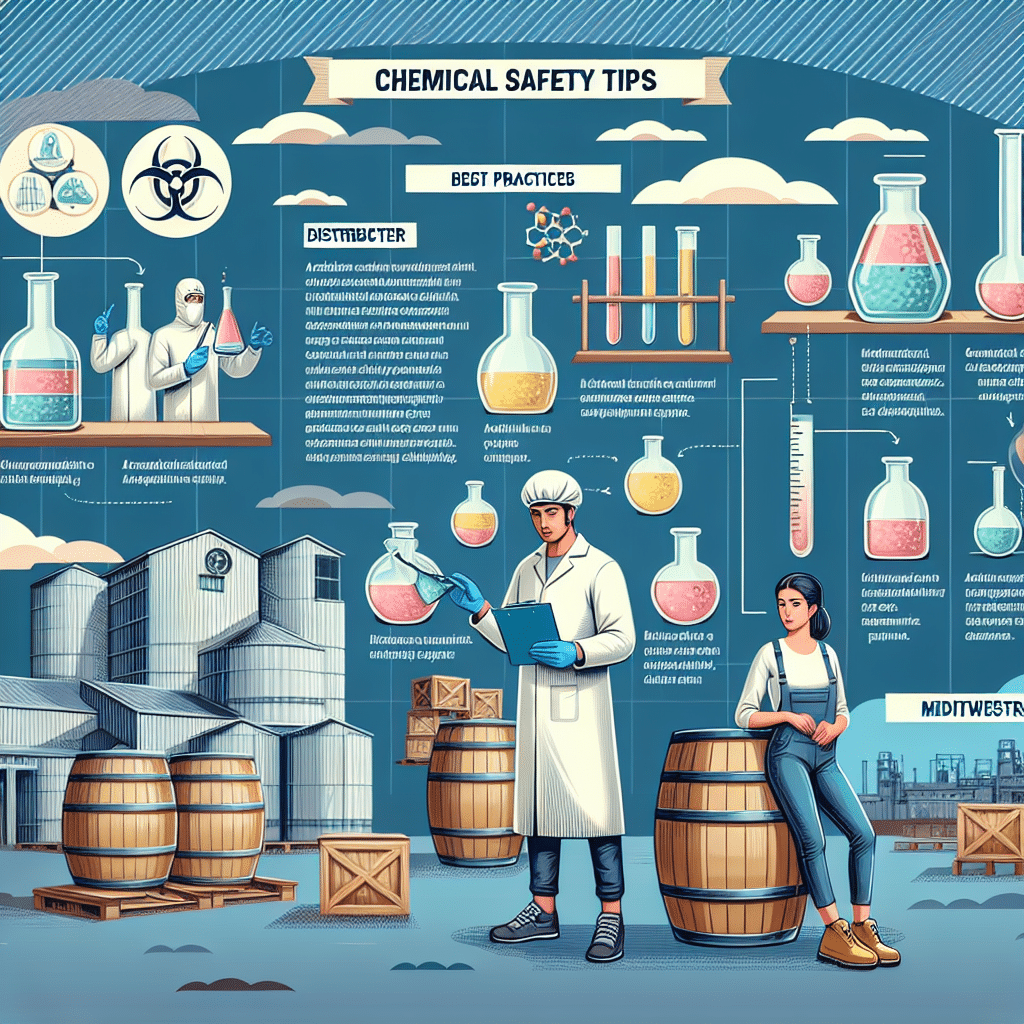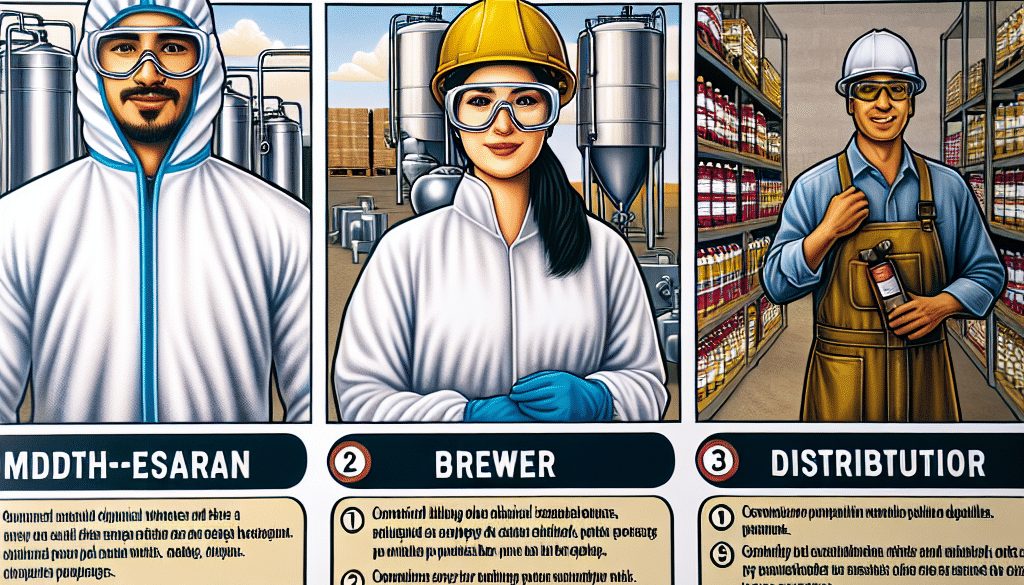Chemical Safety Tips for Wineries, Breweries, and Distributors
-
Table of Contents
- Chemical Safety Tips for Wineries, Breweries, and Distributors
- Understanding the Risks in Alcohol Production
- Implementing a Chemical Safety Plan
- Proper Storage and Labeling of Chemicals
- Employee Training and Personal Protective Equipment (PPE)
- Safe Handling and Disposal of Chemicals
- Emergency Preparedness and Response
- Regular Safety Audits and Inspections
- Maintaining Ventilation Systems
- Conclusion: Prioritizing Safety in Alcohol Production
- Enhance Your Beverage Production with ETprotein’s High-Quality Protein Products
Chemical Safety Tips for Wineries, Breweries, and Distributors

The production of wine, beer, and other alcoholic beverages is an intricate process that involves the careful handling of various chemicals. From cleaning agents to stabilizers, the use of chemicals is integral to ensuring product quality and safety. However, improper handling can lead to accidents, health hazards, and environmental damage. This article provides essential chemical safety tips for wineries, breweries, and distributors to maintain a safe working environment and protect their employees, customers, and the surrounding ecosystem.
Understanding the Risks in Alcohol Production
Before delving into safety tips, it’s crucial to understand the risks associated with the chemicals used in alcohol production. These can include corrosive cleaning agents, toxic additives, and flammable substances. According to the Occupational Safety and Health Administration (OSHA), chemical accidents can result in injuries, chronic health conditions, and even fatalities if not managed properly.
Implementing a Chemical Safety Plan
Every facility should have a comprehensive chemical safety plan that includes the following elements:
- Identification of all chemicals used in the production process
- Proper labeling and storage of chemicals
- Training for employees on handling chemicals safely
- Emergency response procedures
- Regular review and updating of safety protocols
Proper Storage and Labeling of Chemicals
Chemicals should be stored in a designated area with appropriate containment measures to prevent spills and leaks. They must be clearly labeled with hazard information, and Safety Data Sheets (SDS) should be readily available for all substances. The Globally Harmonized System of Classification and Labeling of Chemicals (GHS) provides a standardized approach to labeling that should be adhered to.
Employee Training and Personal Protective Equipment (PPE)
Employees must be trained on the proper handling of chemicals, including the use of PPE such as gloves, goggles, and aprons. Regular training sessions can ensure that all staff are up-to-date on the latest safety procedures.
Safe Handling and Disposal of Chemicals
When handling chemicals, workers should follow best practices to minimize exposure and prevent accidents. This includes using the correct tools and methods for transferring chemicals and ensuring that waste is disposed of according to local regulations.
Emergency Preparedness and Response
Facilities must have an emergency response plan in place to deal with chemical spills, exposures, or other accidents. This should include first aid measures, spill containment procedures, and notification protocols for local emergency services.
Regular Safety Audits and Inspections
Regular audits and inspections can help identify potential hazards before they lead to accidents. These should be conducted by trained personnel who can assess the effectiveness of current safety measures and recommend improvements.
Maintaining Ventilation Systems
Proper ventilation is crucial in areas where chemicals are used or stored to prevent the buildup of toxic fumes. Ventilation systems should be regularly inspected and maintained to ensure they are functioning correctly.
Conclusion: Prioritizing Safety in Alcohol Production
By implementing these chemical safety tips, wineries, breweries, and distributors can create a safer working environment for their employees and protect the community and environment. Regular training, proper storage and labeling, the use of PPE, and emergency preparedness are all key components of a robust chemical safety plan.
Enhance Your Beverage Production with ETprotein’s High-Quality Protein Products
For wineries, breweries, and distributors looking to enhance their beverage offerings, ETprotein’s range of high-quality protein products can provide an excellent addition. Their organic bulk vegan proteins and L-(+)-Ergothioneine are perfect for creating innovative and health-conscious beverages that cater to the growing market of wellness-focused consumers.
ETprotein’s products are characterized by their neutral taste, non-GMO, and allergen-free attributes, making them an ideal choice for a variety of applications. With L-(+)-Ergothioneine purity over 98%, these proteins can help elevate your products while ensuring safety and quality.
Whether you’re looking to develop new beverage lines or enhance existing ones, ETprotein’s offerings can meet your needs. Contact them today to learn more about their products and how they can benefit your business.
About ETprotein:
ETprotein, a reputable protein and L-(+)-Ergothioneine (EGT) Chinese factory manufacturer and supplier, is renowned for producing, stocking, exporting, and delivering the highest quality organic bulk vegan proteins and L-(+)-Ergothioneine. They include Organic rice protein, clear rice protein, pea protein, clear pea protein, watermelon seed protein, pumpkin seed protein, sunflower seed protein, mung bean protein, peanut protein, and L-(+)-Ergothioneine EGT Pharmaceutical grade, L-(+)-Ergothioneine EGT food grade, L-(+)-Ergothioneine EGT cosmetic grade, L-(+)-Ergothioneine EGT reference grade and L-(+)-Ergothioneine EGT standard. Their offerings, characterized by a neutral taste, non-GMO, allergen-free attributes, with L-(+)-Ergothioneine purity over 98%, 99%, cater to a diverse range of industries. They serve nutraceutical, pharmaceutical, cosmeceutical, veterinary, as well as food and beverage finished product distributors, traders, and manufacturers across Europe, USA, Canada, Australia, Thailand, Japan, Korea, Brazil, and Chile, among others.
ETprotein specialization includes exporting and delivering tailor-made protein powder and finished nutritional supplements. Their extensive product range covers sectors like Food and Beverage, Sports Nutrition, Weight Management, Dietary Supplements, Health and Wellness Products, and Infant Formula, ensuring comprehensive solutions to meet all your protein needs.
As a trusted company by leading global food and beverage brands and Fortune 500 companies, ETprotein reinforces China’s reputation in the global arena. For more information or to sample their products, please contact them and email sales(at)ETprotein.com today.












